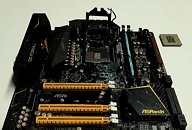Friday, November 30th 2018

Core i9-9900K Achieves 5.50 GHz Overclock on a Z170 Chipset Motherboard
It is already established that the incompatibility between Intel's 8th and 9th generation Core socket LGA1151 processors and Intel's 100-series and 200-series chipset motherboards is artificial, and that with the right BIOS modding, you can get the newer processors to work on the older motherboards. Finnish overclocker "Luumi" made a video demonstration of an i9-9900K successfully overclocking to 5.50 GHz all-core on an ASRock Z170M OC Formula micro-ATX motherboard. The overclocked processor is CineBench and Prime95 stable.
Officially, Intel carved out the 300-series chipset platform to ensure its "Coffee Lake" 6-core processors are given motherboards with a sufficiently powerful VRM setup to keep up with the increased core-count, such as this motherboard with its astoundingly powerful VRM. Unofficially, it's believed Intel created the boundary between 300-series and older LGA1151 platforms, just so motherboard vendors are assured of selling new product lines every two generations of Intel processors. In contrast, AMD's AM4 platform already supports three generations of processors, and is scheduled to support future generations running up to 2020.Lummi's video presentation follows.
Officially, Intel carved out the 300-series chipset platform to ensure its "Coffee Lake" 6-core processors are given motherboards with a sufficiently powerful VRM setup to keep up with the increased core-count, such as this motherboard with its astoundingly powerful VRM. Unofficially, it's believed Intel created the boundary between 300-series and older LGA1151 platforms, just so motherboard vendors are assured of selling new product lines every two generations of Intel processors. In contrast, AMD's AM4 platform already supports three generations of processors, and is scheduled to support future generations running up to 2020.Lummi's video presentation follows.

33 Comments on Core i9-9900K Achieves 5.50 GHz Overclock on a Z170 Chipset Motherboard
I think Intel's main argument though was the power delivery was wrong, they admitted it could work on older chipsets, but long term quality of life could not be promised. So I mean, this article still is a moot point when you understand Intel's logic on it.
That being said, it's all dumb anyway. If I don't have Intel 10nm build PC by winter 2019 I am rage quitting, or 7nm vega 2 navi w.e its called doesn't even come close to 2080 ti... rage quits incoming, hobby is getting silly as crap.
Also they (Intel) didn't admit anything, like usual, it was ASUS.
People need to chill the f out. Its obviously a bad time for hardware, most notably GPU. I think CPU is actually in a fantastic place right now and DDR is getting to manageable levels. Storage has progressively become cheaper over the last five years, and the content has diversified in a great way. You may not like all of it, but the state of this market is more healthy and alive than it'll ever be - again, except for GPU.
The funny thing is, if they had just changed the socket number, added one extra pin and called it 1152, no one would have batted an eye on the whole situation.
:):):)
I'll be enjoying my 7nm Ryzen 3000 series with superior performance and efficiency while you quit building high-end PCs because Intel done goofed.
currently Intel 9900k gets 30 fps higher at 1080p over ryzen (and I own 3 monitors, 1 4k, 1 240hz 1080p, and 1 1440p 165hz) so that extra 30 is nice for competitive shooters at 240hz. also intel gets 10 fps higher min refresh better in games across the board with 9900k vs 2700x = smoother overall gameplay, though I admit at higher refresh you can't notice, but at 4k 60hz, 7 fps on a dip, however quick it may be, is noticeable in games.
so enjoy your inferior gaming experience, or wait for benches! :)